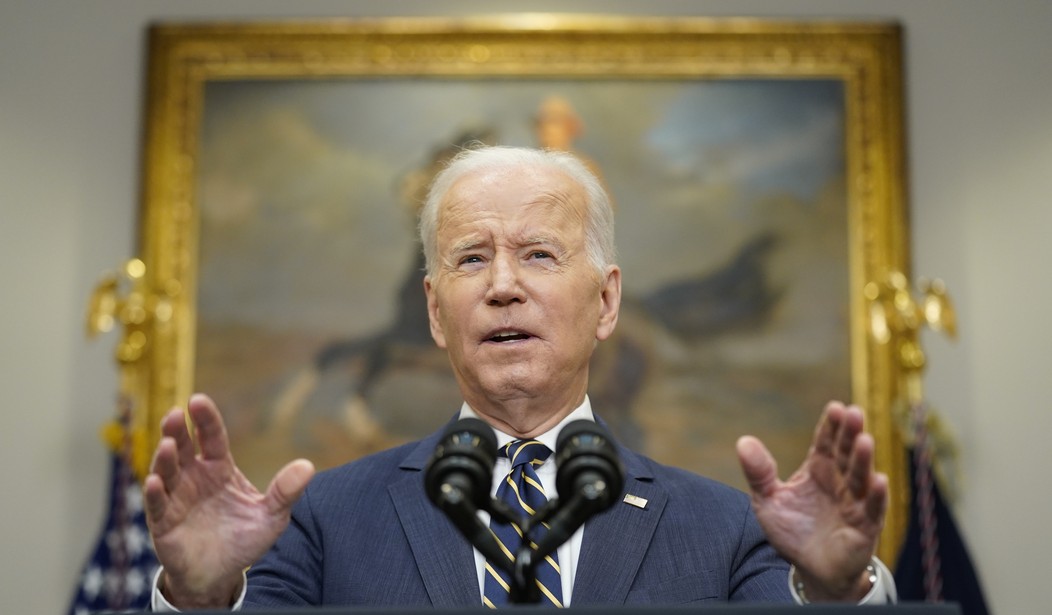With gas prices easing last month, some expected the overall rate of inflation in the Consumer Price Index to slow from its previously torrid pace. Wrong! The rate of inflation got worse in June, jumping 1.3% month-on-month from May, which had increased 1.0% from April. Year-on-year CPI accelerated to 9.1%, up from last month’s 8.6%:
The Consumer Price Index for All Urban Consumers (CPI-U) increased 1.3 percent in June on a seasonally adjusted basis after rising 1.0 percent in May, the U.S. Bureau of Labor Statistics reported today. Over the last 12 months, the all items index increased 9.1 percent before seasonal adjustment.
The increase was broad-based, with the indexes for gasoline, shelter, and food being the largest contributors. The energy index rose 7.5 percent over the month and contributed nearly half of the all items increase, with the gasoline index rising 11.2 percent and the other major component indexes also rising. The food index rose 1.0 percent in June, as did the food at home index.
The index for all items less food and energy rose 0.7 percent in June, after increasing 0.6 percent in the preceding two months. While almost all major component indexes increased over the month, the largest contributors were the indexes for shelter, used cars and trucks, medical care, motor vehicle insurance, and new vehicles. The indexes for motor vehicle repair, apparel, household furnishings and operations, and recreation also increased in June. Among the few major component indexes to decline in June were lodging away from home and airline fares.
Small wonder that the White House began signaling this week to prepare for bad news. This level of CPI inflation hits a new 41-year record, and blew through expectations that already were pessimistic:
The consumer price index, a broad measure of everyday goods and services, soared 9.1% from a year ago, above the 8.8% Dow Jones estimate. That marked another month of the fastest pace for inflation going back to December 1981.
Excluding volatile food and energy prices, so-called core CPI increased 5.9%, compared to the 5.7% estimate.
Let’s take a look at the components of the CPI assessment. Not a single category of goods and services even came close to the Fed’s 2% inflation target for stability. The lowest level of inflation came in medical care commodities, which rose 3.2% year on year. Fuel oil dropped 1.2% month-on-month, but was still up 98.5% year on year.
Everything else, though, is spiking upward. Heather Long presents some highlights:
Inflation continues to hit hard:
Groceries: up 12% in past year –>Biggest annual increase since 1979
Chicken: Up 19% in past year–>Biggest increase ever
Gas up 60%–>Biggest since 1981
Electricity: Up 14% –>Biggest since 2006
Rent: Up 5.8% –>Biggest since 1986
— Heather Long (@byHeatherLong) July 13, 2022
Food inflation is almost entirely in double digits for year-on-year CPI. It’s amazing what consumers are now facing at the grocery store:
- Cereals and bakery products: 13.8%
- Meat, poultry, fish, eggs: 11.7%
- Dairy products: 13.5%
- Nonalcoholic beverages and related products: 11.9%
- Coffee: 15.8%
- Carbonated drinks: 11.0%
- Other food at home: 14.4%
The only category not to hit double digits is fruits and vegetables, which went up 8.1% YoY but actually dropped last month -0.3%, the only category to do so.
Non-food items went up across the board, too. Why? Probably because diesel keeps going up, rising 75.8 YoY and 3.9% in June alone. That infects the prices of all other goods and services along the distribution chain. The rates of increase for non-food and non-energy goods and services rose at a less torrid pace, but still faster than it did last month.
And let’s not forget that the year-on-year comparison basis now lands on months that were already at accelerated inflation levels. That means these new year-on-year results are worse than they appear. That’s a 9.1% CPI rate based on a June 2021 result that was well above 5% CPI inflation on its own.
Time to update the charts:


Was this “unexpectedly”? The markets seem to have been surprised by this result. Dow futures dropped by 400 points immediately after the BLS announcement:
Stock futures slid on Wednesday after June inflation data came in hotter-than-expected, contributing to growing fears that the Federal Reserve will get more aggressive in its fight to tame rising prices.
Futures tied Dow Jones Industrial Average dropped 300 points, or 0.98%. S&P 500 futures fell 1.46% and Nasdaq 100 futures lost 2.13%.
“There’s no spinning this, other than the Fed has to get more aggressive near term and crush demand. that cements a recession now, ” said Liz Ann Sonders of Charles Schwab. “I think a recession is an inevitability.”
Indeed. The Federal Reserve will have no choice but to get even more aggressive in containing inflation, and they are a long way off from getting it under control. Traditionally, the Fed’s interest rate should be even with core CPI to start arresting inflation. Right now the core CPI is at 5.9% while the Fed’s rate is at 1.75%. We will have to wait until the late fall before the Fed can even get close to that measure, which means we’ll keep paying double-digit percentage increases at the grocery store for several months.
And what else do Democrats want us to discuss in the upcoming election?








Join the conversation as a VIP Member